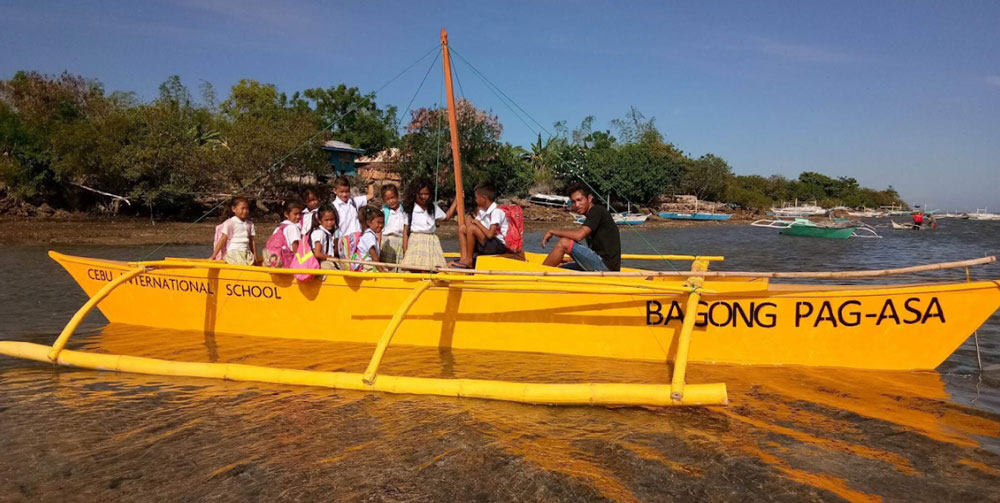
Grade 4 and 5 inquirers explored Filipino influential people, how they made decisions, and what their responsibilities to the community were. (Photo source: Freshal Abcede)
---------------------------------------------------------------------------------
What is your passion?
Who are the people who share the same passions as you?
What actions did they take in response to issues concerning your passions?
These are the questions that helped drive the inquiry of Grade 4 and 5 students in their Philippine Language and Culture class at Cebu International School. These questions have guided the students to learn about a selected number of influential people who have inspired and contributed positively to their respective communities. In addition, students also understood how and why they are influential and defined their traits in relation to the International Baccalaureate (IB) Learner Profile Attributes. Throughout the process, they learned about some interesting influential people who have passions for sports, charity, education, and the environment, and how their passions have led them to realize the issues surrounding their passions. As they tried to dive deeper, the students were able to identify connections between the Sustainable Development Goals (SDGs) and issues related to their passions.
The actions taken by these influential people were rooted in their values and beliefs. To obtain a greater understanding of this concept, the students scribbled down what they believe in and the values that are significant to them. Many of the students highlighted the values of kindness, family, friends, teachers, the environment, school, or education, and their beliefs in unity, freedom, fairness, honesty, and love. They learned the importance of knowing and understanding one’s personal values and beliefs as these can impact a person’s choice, attitude, and action that may allow them to contribute positively to their communities in simple yet meaningful ways. The students recognized the significance of taking action, caring for others, and showing empathy and compassion to those around them.
In their homeroom class, the students were introduced to the UN Convention on the Rights of the Child. This became a perfect opportunity for students to further explore the issues surrounding their passions during their Philippine Language and Culture class. It prompted a focus on the explorations of the influential people who, through their actions, helped promote children's rights in the Philippines. The fourth graders created posters about various Filipino organizations, and they took turns listening and sharing their knowledge. The students were given the agency to brainstorm and gather essential information from articles to learn about their assigned organization. One of these organizations, Childhope Philippines, works to promote the welfare of street children. Another, The Yellow Boat of Hope Foundation, was inspired by the children of Layag-Layag, Zamboanga City who had to swim across the river to get to school. This organization now works to help improve children's access to education by building boats and helping students to easily get to school. Finally, Hope Worldwide Philippines provides assistance to abused, orphaned, exploited, abandoned, and trafficked children by rescuing them and giving them a safe place as well as opportunities for their families, ensuring the promotion and protection of their rights.

The Yellow Boat of Hope Foundation, in partnership with the Cebu International School, provides yellow school boats and other modes of transport and structures (such as boats, bridges, and dormitories) to help struggling children get to school in Cebu and Bohol islands, ensuring no child is left behind, which means changing the world into a better place through every child’s education. (Photo source: Arnulfo “Ace” Pierra Jr., CIS Service Learning Coordinator)
In order to challenge the fifth graders’ thinking, they were asked to individually choose which of the children’s rights were most important to them. The students were then tasked to take on the roles of influential people and explain their chosen rights to the class. The students were able to expound on the significance of their chosen rights and what possible actions they could take to help protect these rights. Some of the students were also able to make connections with their recently concluded Primary Years Programme Exhibition that showcased their passions, such as the right to education, the right to a standard of living that is good enough to meet their physical and mental needs, the right to good quality health care, clean water, nutritious food, and a clean environment. The Grade 5 class engaged in a role-play activity to demonstrate how they would respond to influence others and protect children’s rights. Both classes showed an impressive understanding of the concepts and demonstrated their ability to work independently and collaboratively with peers.
"What is the importance of learning about influential people?", one student wondered out loud. Another student tried to answer the question by explaining that learning about influential people may help you or our community to work out specific problems that we are facing, such as environmental issues, access to education, or even children's rights. The class studied and dug deeper into what it takes to be influential and be fully aware of the responsibility when influencing others within their community. Influential people place emphasis on how to create the impact they want to have and acquire the outcomes they get for the betterment of everyone. To influence change you do not need to be a leader or someone in the highest position in a country or organization. Sometimes the smallest act of kindness, such as smiling or saying hello to the people around you, can have the greatest impact on someone's day. By thinking locally, you can take immediate and significant actions that benefit you and those around you, no matter how big or small. The fact of the matter is, nothing restricts you from getting started right away.
---------------------------------------------------------------------------------
Freshal is the Grade 4 and 5 Philippine Language and Culture teacher at Cebu International School.
Twitter: @a_freshalabcede